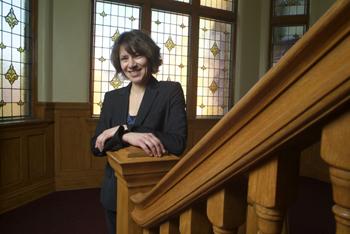Michèle Preyde

My programs of research on the psychosocial impacts of medical and mental illnesses, and relational disorders have been developed through practitioner-researcher collaboration. Our research is guided by professionals with experiential knowledge and involves interacting with participants who are patients or clients and their families often at a time when they are most vulnerable. These practitioners and service recipients are located in various settings including acute care settings, outpatient care, community agencies, and the homes of service recipients which could include foster or group homes. The process of collaboration before, during and after the conduct of the research is quite enriching.
PhD in Social Work, University of Toronto
MSW, Wayne State University
Preyde, M., Parekh, S., & Heintzman, J. (2025). Examining the Associations Between Parental Distress in Caregivers of Children Accessing Outpatient Psychiatry with Caregiver Ratings of Child Symptom Severity, Family Functioning, Financial Hardship, Social Support and Self-Care. Adolescents, 5(3), 43. https://doi.org/10.3390/adolescents5030043Preyde, M., & Horne, E. (2024). Youth Discharged from Residential Mental Health Treatment: A Case Study of Four Youth Who Identify as Indigenous. Child & Youth Services, 1–20. https://doi.org/10.1080/0145935x.2024.2336908 Preyde, M., Parekh,
D’Angelo, A., Ofosu, A., & Preyde, M. (2023). Adolescents Hospitalized for Psychiatric Illness: Caregiver Perspectives on challenges. Adolescents, 3(4), 651–667. https://doi.org/10.3390/adolescents3040046
Preyde et al. (2022). Vulnerable Populations: Comparison of Characteristics of Adolescent Inpatients with Substance Use Disorder and a History of Child Maltreatment to Inpatients without a History of Child Maltreatment: A Retrospective Chart Review. Adolescents, https://www.mdpi.com/2673-7051/2/1/3 (Open access)
Preyde et al., (2022). Exploring screening for borderline personality disorder in pediatric inpatients with psychiatric Illness. Psychiatry Research, 309, 1-6. https://www.sciencedirect.com/science/article/pii/S0165178122000117?via%3Dihub (Open access)
Frensch,K, Ashbourne,G, MacLeod,K, Bartlett D & Preyde, M. (2022) Better than Expected: Young Adults’ Perceptions of Community Living after Children’s Residential Mental Health Treatment, Residential Treatment for Children & Youth, 39:1, 57-80, DOI: 10.1080/0886571X.2020.1751019
Preyde et al. (2021). School Re-Entry of Adolescent Patients Discharged from Psychiatric Hospital: One Step in Continuous Quality Improvement. Adolescent Psychiatry. 11(4), 260-275.
Preyde et al. (2021). Clinical, Discharge and Psychosocial Profiles of Adolescents with Substance Use Disorder Accessing Inpatient Psychiatry in Ontario, Canada, Adolescent Psychiatry, 11(10, 63-76. https://www.eurekaselect.com/article/115368 (Open access)
Preyde et al. (2021). Electronic Device Utilization, Bullying, School Experiences and Discharge Destination of Youth Admitted to an Inpatient Unit for Psychiatric Illness. Residential Treatment for Children and Youth, DOI: 10.1080/0886571X.2021.1899883
Preyde, M, MacLeod, K, Bartlett, D, Ogilvie*, S, Frensch*, K, Walraven, K & Ashbourne, G. (2020) Youth Transition after Discharge from Residential Mental Health Treatment Centers: Multiple Perspectives over One Year, Residential Treatment for Children & Youth, 37:1, 65-89, DOI: 10.1080/0886571X.2019.1597664
McBride* & Preyde. (2020). Loneliness and Social Isolation in a Sample of Youth Hospitalized for Psychiatric Illness. Child and Adolescent Social Work Journal. https://doi.org/10.1007/s10560-020-00723-y
Michèle Preyde, Diane Bartlett, Jeff Carter, Kelly Walraven, Sonya Ogilvie* & Graham Ashbourne (2018) Exposing challenges in transitioning post residential mental health treatment: The case of the “Poster child”, Residential Treatment for Children & Youth, 35:4, 336-349, DOI: 10.1080/0886571X.2018.1485127
Preyde, M., Parekh, S., Warne, A., & Heintzman, J. (2017). School Reintegration and Perceived Needs: The Perspectives of Child and Adolescent Patients During Psychiatric Hospitalization. Child and Adolescent Social Work Journal.
Preyde, M., Carter, J., Penney, R., Lazure, K., & Vanderkooy, J. (2015). Integrated Knowledge Translation: Illustrated with Outcome Research in Mental Health. Journal of Evidence-based Social Work, 12(2), 175-83.
Preyde, M., Watkins, H., Ashbourne, G., Lazure, K., Carter, J., Penney, R., White, S., Frensch, K., Cameron, G., (2013): Perceptions of Personal Well-Being Among Youth Accessing Residential or Intensive Home-Based Treatment, Residential Treatment for Children & Youth, 30 (1), 1-22. To link to this article: http://dx.doi.org/10.1080/0886571X.2012.725372
Preyde, M., Ardal, F., Chevalier, P., Savage, D., & Sulman, J. (2013). Integrated Knowledge Translation: Hospital-based Social Work. Social Work Research, 37, 339-347.
Preyde, M., Frensch, K., Cameron, G., White, S., & Penney, R. (2011). Long-term Outcomes of Children and Youth accessing Residential or Intensive Home-based Treatment: Three year follow up. Journal of Child and Family Studies, 20, 660-668.
Community Engaged Scholarship/Research Collaborations
Most of my research is conducted with clinical partners. Through this practitioner-researcher collaboration, we have conducted studies principally in acute care settings and community-based mental health and social service agencies. Practitioners include a wide range of professionals in community development, medicine, psychiatry, nursing, social work, mental health and the often vulnerable patients or clients and families they serve.
As principal investigator, I currently have three research projects in progress.
The first is a longitudinal study of the transition experiences of youth discharged from residential mental health treatment centres. We are using a case study design that includes phenomenological (at one-point in time) and narrative (across time periods) approaches, and clinical data and standardized measures of strengths and difficulties, and coping. The second study is a psychosocial and sexual health needs assessment of patients with prostate cancer. For the third, we are in the dissemination phase of a study on the school-related difficulties and difficulties with school reintegration of youth who had been hospitalized for psychiatric illness.
Future projects are in the initial phases of conception and include aspects of psychosocial well-being, identity and relationships.